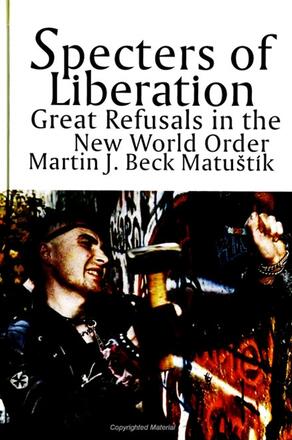
Specters of Liberation
Great Refusals in the New World Order
Alternative formats available from:
Advocates a new existential and political coalition among critical and postmodern social theorists and among critical gender, race, and class theorists, in dissent from the New World Order, to raise specters of liberation and empower radical democratic change.
Description
Specters of Liberation argues that dissent against the New World Order is possible through a collaboration of critical postmodern social theory and existential philosophy. It integrates those Western, Eastern European, and postcolonial approaches to democratic theory that provide the best alternatives to today's nationalist and racial conflicts and offer the best prospects for a free world. Rigorously argued and written in an impassioned voice, it examines multidimensional specters of liberation and resources for democratic change after 1989. Inspired by the persistence of the Marcusean Great Refusal, Matustik takes up a wide variety of issues, ranging from the encounter between critical social theory and existential philosophy found in the works of Herbert Marcuse to the contributions of Czech existential phenomenology to democratic theory, with attention to the works of Havel.
Martin J. Beck Matustik is Associate Professor of Philosophy at Purdue University. He is the author of Postnational Identity: Critical Theory and Existential Philosophy in Habermas, Kierkegaard, and Havel, and coeditor, with Merold Westphal, of Kierkegaard in Post/Modernity. Matustik left Prague for political reasons in 1977, and after eight months in an Austrian refugee camp immigrated to the United States. As a Fulbright Fellow in Germany, he studied with Jurgen Habermas during revolutionary events of 1989-1991.
Reviews
"Matustik's Specters draws on a wide range of thinkers to develop perspectives on contemporary prospects for liberation and struggle. Overcoming sterile polemics between modern and postmodern theorists, Matustik shows that both traditions contribute to analyzing and surmounting situations of suffering and distress throughout the globe. " -- Douglas Kellner, The University of Texas at Austin
"The strength of this volume is its thesis: that dissent is possible against the New World Order through an appeal to a marriage of critical theory and philosophy of existence. Although the author has espoused this thesis in an earlier work, he has updated the discussion and shifted the lens through which it is seen--namely, the liberatory critical thought of, among others, Marcuse and Fanon. The book is at its theoretical best, in fact, when the author engages this dynamic and pursues its influence on contemporary theorists such as Cornel West, Lucius Outlaw, Drucilla Cornell, and Iris Marion Young. " -- Lewis Gordon, Brown University
"In this era of lowered expectations, Martin Matustik pricks the conscience of critical theorists and postmodernists to settle for nothing less than human liberation. " -- Iris M. Young, University of Pittsburgh